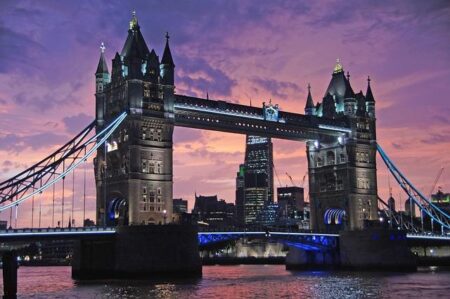In a striking reflection of shifting economic and social dynamics, one of the United Kingdom’s wealthiest billionaires has made headlines by relocating from London to the United Arab Emirates. Citing growing frustrations with the UK’s current climate, the move underscores broader concerns among the ultra-rich about taxation, regulation, and quality of life. This development not only highlights the challenges facing Britain’s capital but also signals the UAE’s rising appeal as a global hub for affluent individuals seeking stability and favorable conditions.
Britains Wealth Exodus Spotlight on Rising Taxes and Economic Uncertainty
The exodus of Britain’s wealthiest individuals is gaining momentum amid growing concerns over rising taxes and the unpredictability of the UK’s post-Brexit economy. High-profile billionaires, once proud flag-bearers of London’s financial might, are increasingly seeking refuge in more tax-friendly jurisdictions like the UAE. Experts attribute this shift not only to punitive tax policies but also to a broader atmosphere of economic uncertainty that is dampening investment and stifling confidence. According to recent reports, the move is influenced by a combination of soaring income tax rates, stricter capital gains taxes, and an unpredictable regulatory environment that fails to favor entrepreneurial activity.
Key factors driving this trend include:
- Increased tax burden: Top earners face taxes upwards of 45%, with additional surcharges narrowing the gap to fellow global cities.
- Economic volatility: Inflationary pressures and supply chain disruptions have added to financial unpredictability.
- Brexit aftermath: New trade barriers and uncertainty over market access have dampened business prospects.
- Quality of life considerations: Many cite concerns over rising crime rates, public services strain, and overall living conditions.
| Factor | Impact Level | Effect on Wealth Migration |
|---|---|---|
| Income Tax Increase | High | Strong Push |
| Economic Uncertainty | Medium | Moderate Push |
| Regulatory Complexity | High | Strong Push |
| Quality of Life | Medium | Additional Factor |
Impact of Urban Challenges on High-Net-Worth Individuals Decision to Relocate
Urban challenges such as soaring crime rates, congested transportation networks, and escalating costs of living have increasingly influenced the decisions of high-net-worth individuals (HNWIs) to reconsider their residency. London, once hailed as a global financial hub offering a blend of culture, prestige, and opportunity, now faces criticism over diminishing public safety, inconsistent policy frameworks, and an evolving socio-political landscape. For many billionaires, these growing urban pressures translate into daily inconveniences and perceived risks that are incompatible with their lifestyle expectations and business needs.
Key factors driving relocation decisions among affluent individuals include:
- Security concerns amidst rising crime and disturbances
- Tax regimes and financial incentives tailored to wealth preservation
- Quality of infrastructure and ease of doing business
- Access to exclusive social and networking environments
- Climate and lifestyle amenities promoting well-being
| Factor | London | UAE (Dubai/Abu Dhabi) |
|---|---|---|
| Crime Rate | Increasing | Low |
| Taxation | High Income Taxes | 0% Personal Income Tax |
| Quality of Life | Challenging Commute & Cost | Luxurious Amenities & Comfort |
| Business Climate | Bureaucratic | Pro-Business & Incentivized |
Policy Recommendations to Retain Billionaire Investors and Boost Economic Stability
To mitigate the ongoing exodus of billionaire investors, the UK government must prioritize creating a more attractive financial and regulatory landscape. This includes implementing competitive tax policies that balance revenue generation without stifling investment incentives. Additionally, fostering a predictable and transparent regulatory framework will provide the stability and confidence that high-net-worth individuals seek. Investing in innovation hubs and reducing bureaucratic red tape can further entice billionaires to anchor their wealth and enterprises within British borders.
Equally important is the cultivation of an environment that promotes long-term economic stability and wealth retention through targeted support schemes and enhanced public-private partnerships. Key strategies involve:
- Modernizing immigration policies to facilitate seamless relocation for international investors and skilled professionals.
- Strengthening legal protections for assets and intellectual property to secure investor confidence.
- Enhancing infrastructure investments to position the UK as a global commerce and financial hub.
| Policy Area | Proposed Action | Expected Outcome |
|---|---|---|
| Taxation | Adjust capital gains rates | Encourage reinvestment |
| Regulation | Simplify compliance | Reduce exit risk |
| Immigration | Fast-track investor visas | Boost foreign inflows |
Future Outlook
The decision of one of the UK’s wealthiest billionaires to leave London for the UAE underscores growing concerns among the elite about the economic and political climate in Britain. As high taxes, regulatory pressures, and shifting social dynamics continue to shape the landscape, the migration of influential figures may signal a broader trend of capital and talent seeking more favorable environments abroad. How the UK government responds to these challenges could prove critical in retaining its status as a global financial hub in the years to come.




